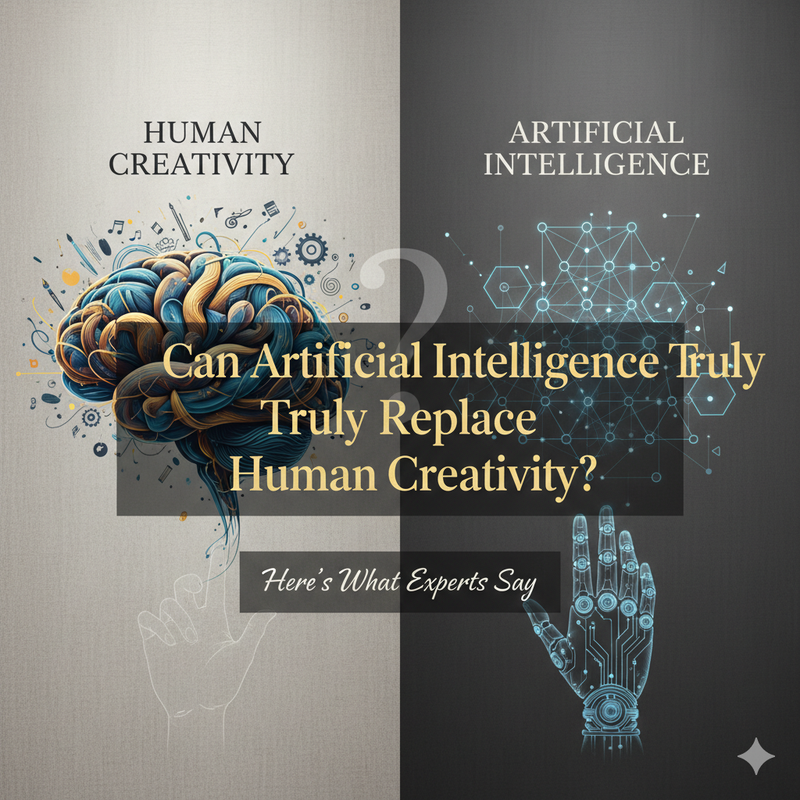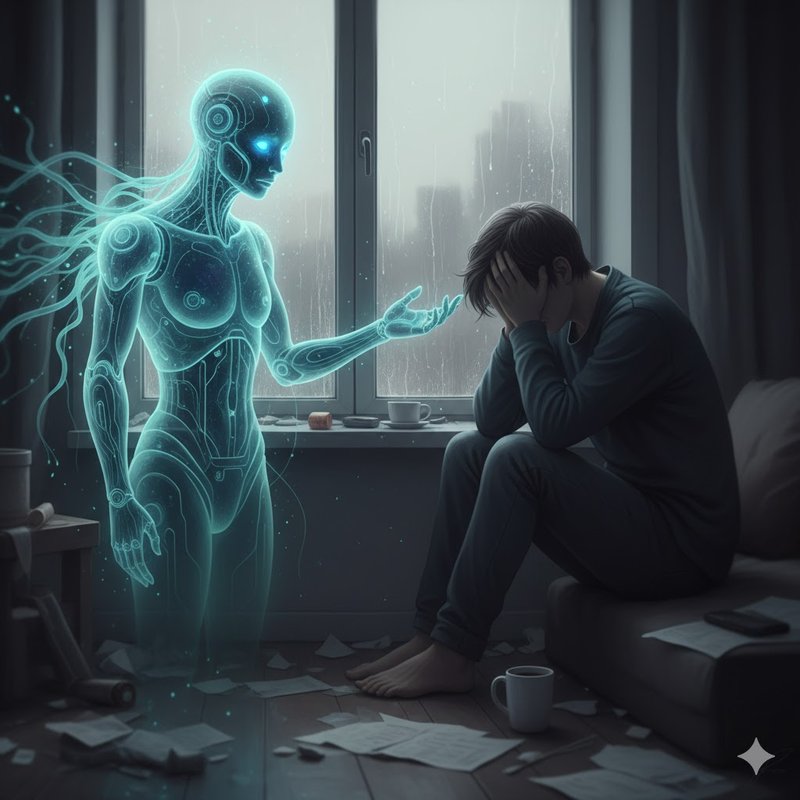Can Artificial Intelligence Truly Replace Human Creativity? Here’s What Experts Say

In a world increasingly shaped by algorithms, automation, and data-driven systems, one question continues to challenge our imagination:
Can artificial intelligence truly replace human creativity?
From art to music, from storytelling to product design — AI is now stepping into spaces once believed to be exclusively human. But can a machine really create the way a person does? Or is it just mimicking patterns we’ve already laid down for it?
Let’s dive deep into this question — through expert insights, real-world examples, and the philosophy behind creativity itself — to see where humanity stands in this digital age.
The Rise of Artificial Creativity
Over the past decade, artificial intelligence has evolved from a futuristic concept to a daily companion. Whether it’s ChatGPT writing essays, DALL·E generating digital artwork, or Google’s DeepDream producing surreal imagery, AI has proven it can generate creative outputs that impress even seasoned artists and thinkers.
What’s fascinating is that this creativity doesn’t come from emotion or inspiration but from data and deep learning algorithms. These systems analyze millions of samples, identify recurring structures, and generate something new that statistically fits the pattern of “creative” content.
But here’s the real question: Is that creativity — or just computation?
Defining Creativity: The Human vs. Machine Debate
Before deciding whether AI can replace human creativity, we need to define what creativity actually is.
At its core, creativity is the ability to produce something original, valuable, and meaningful. It’s driven by intuition, emotion, experience, and a sense of purpose — all deeply human elements.
AI, on the other hand, operates on logic and probability. It doesn’t feel wonder, confusion, fear, or joy — emotions that often fuel creative expression.
As Dr. Margaret Boden, a cognitive scientist at the University of Sussex, puts it:
“AI can surprise us with new combinations and insights, but it doesn’t know what it’s doing. It lacks intentionality — and that’s what separates invention from imitation.”
This distinction — between creating and generating — lies at the heart of the debate.
AI in Art: Inspiration or Imitation?
When AI-generated art first began making headlines, many called it revolutionary. Others saw it as a threat. Platforms like Midjourney, Stable Diffusion, and DALL·E can produce jaw-dropping images in seconds from a simple text prompt.
Artists feared they were witnessing the automation of their passion — that machines would replace illustrators, designers, and even painters.
However, what many experts realized is that AI doesn’t destroy art — it redefines it.
AI art is not the death of creativity; it’s the evolution of collaboration.
As Sougwen Chung, an artist who paints alongside AI, says:
“The brush isn’t what defines the artist — the intention does. AI is just another brush.”
So while machines can generate forms, patterns, and even emotions through design, it is humans who direct, refine, and interpret that output.
AI in Writing and Storytelling
AI writing tools like ChatGPT, Jasper, and Writesonic have opened doors for writers, marketers, and students alike. They can draft articles, generate ideas, and even create poetry.
But the deeper you analyze it, the clearer it becomes — AI isn’t truly writing; it’s assembling.
It understands patterns of syntax and style but not the feeling behind words.
Human creativity, especially in storytelling, comes from lived experience — heartbreak, humor, pain, discovery. These emotional layers give writing depth and authenticity that no model can replicate.
That’s why even though AI can produce words, it can’t feel meaning.
It may help us express, but it cannot replace what we express from within.
The Role of Emotion in Creativity
Emotion is the secret ingredient that powers all forms of creativity.
When Beethoven composed his symphonies, when Van Gogh painted Starry Night, when a filmmaker captures heartbreak on screen — what connects us is the emotional resonance.
AI lacks this. It can analyze emotion, simulate empathy, and mimic patterns that humans associate with feeling — but it doesn’t actually experience emotion.
According to Dr. Fei-Fei Li, Co-Director of Stanford’s Human-Centered AI Institute:
“AI can see patterns in pixels and words, but it cannot see beauty, love, or suffering. That perception still belongs only to us.”
So while AI can assist the creative process, it’s ultimately humans who provide the soul behind the structure.
Can AI Innovate Without Human Input?
Creativity is not only about making something new — it’s about making something new on purpose.
True innovation requires curiosity, context, and a goal — all of which come from consciousness.
AI’s “innovation” is reactive. It responds to data but doesn’t initiate change unless instructed to.
Consider AlphaGo, the AI system that beat human champions at Go. Its strategies seemed “creative” and “unexpected,” yet they were still grounded in pattern recognition and reinforcement learning — not insight or imagination.
Humans, however, innovate not because data tells us to — but because we dream of something beyond the data.
The Collaborative Future: Humans + AI
Instead of framing the question as “Will AI replace creativity?”, experts now suggest a better one:
How can AI enhance human creativity?
AI can remove repetitive tasks, offer new perspectives, and expand what’s possible. It can generate design variations in seconds, suggest plot ideas, or simulate musical compositions.
But the direction, emotion, and vision — that’s where humans remain irreplaceable.
Think of AI not as a competitor but as a creative partner — a collaborator that amplifies our imagination.
As Ilya Sutskever, co-founder of OpenAI, stated:
“AI will not replace humans. Humans who use AI will replace humans who don’t.”
The future belongs to those who merge artistry with algorithms.
The Ethical Question: Should AI Replace Human Creativity?
Even if AI could replace human creativity — should it?
Automation can make content creation faster and cheaper, but at what cost?
If every song, article, or design is machine-generated, we risk losing the diversity that comes from personal perspective.
Ethically, many artists argue that creativity is a human right — a space for emotion, individuality, and rebellion.
Replacing that with uniform AI output might create a technically perfect world… but an emotionally hollow one.
Regulations are already being discussed worldwide to protect human creators from AI-generated plagiarism or data misuse.
So, even as AI grows, the value of human originality will likely rise in response.
The Psychology of Creation: Why Humans Create
Humans don’t create just to produce — we create to connect, communicate, and understand ourselves.
From cave paintings to cinema, every form of art reflects an inner truth.
AI doesn’t need meaning. But humans do.
We create not only to solve problems but to make sense of existence.
That’s why, even with the most advanced algorithms, machines will always miss the why behind creation.
They can generate form, but not philosophy.
AI as a Mirror of Human Imagination
Perhaps the most fascinating aspect of AI is not its intelligence but what it reveals about us.
AI mirrors our creativity back to us — showing our biases, inspirations, and boundaries.
Every AI model is trained on human data. So, in essence, every “creative” output is a reflection of collective human imagination.
That means AI doesn’t replace us — it multiplies us.
It expands what humanity can do by combining the creativity of millions into one powerful system.
What Experts Predict for the Future of Creative AI
Let’s look at what the experts say about the future:
- Sam Altman (OpenAI CEO):
“AI will handle the heavy lifting, but humans will remain the storytellers, inventors, and dreamers.” - Geoffrey Hinton (The Godfather of AI):
“We’re creating systems that can generate ideas — but understanding meaning is still uniquely human.” - Yuval Noah Harari (Historian and Author):
“The next revolution isn’t technological — it’s psychological. We must decide what makes human life meaningful when machines do everything else.”
In short, the consensus is clear: AI is a tool — not a replacement.
It can augment, accelerate, and inspire — but the essence of creativity remains human.
Conclusion: The Future of Creativity Belongs to Collaboration
Artificial intelligence is reshaping the creative world, but not in the way many fear.
It’s not replacing us — it’s challenging us to redefine what it means to create.
Human creativity is emotional, messy, unpredictable, and beautifully imperfect — and that’s exactly what makes it irreplaceable.
AI will continue to revolutionize industries, but the world will still crave human stories, emotions, and originality.
So rather than asking whether AI will replace creativity, perhaps the better question is:
How will we use AI to unlock even deeper levels of human imagination?
FAQs About AI and Human Creativity
1. Can AI be creative on its own?
AI can generate creative-looking results based on data patterns, but it lacks consciousness, intention, and emotion — the core drivers of human creativity.
2. Will AI take over jobs in creative fields?
AI will automate certain creative tasks, but it’s more likely to become a tool for creators rather than a replacement. Human direction remains essential.
3. How does AI help in creative industries?
It accelerates idea generation, enhances design possibilities, and removes repetitive work — allowing humans to focus on higher-level thinking and expression.
4. Can AI write books or paint artworks that match human quality?
AI can imitate styles and create impressive works, but it cannot replicate emotional depth or personal experience — key elements of great art and literature.
5. What is the future of human creativity with AI?
The future is hybrid — a world where human imagination and machine intelligence collaborate to create things neither could achieve alone.
Final Thought:
Artificial intelligence may not replace human creativity — but it’s teaching us more about what creativity truly means.
In the age of machines, our most human quality — imagination — will become our greatest advantage.
Related Posts

Are We Talking to AI More Than People? Why It Might Be Making Us Sadder
People are sharing emotions with AI, but is it dangerous? Learn why …

How AI Makes Our Work Easy: Transforming Everyday Tasks with Technology
Discover how Artificial Intelligence is simplifying everyday tasks and boosting productivity. From …